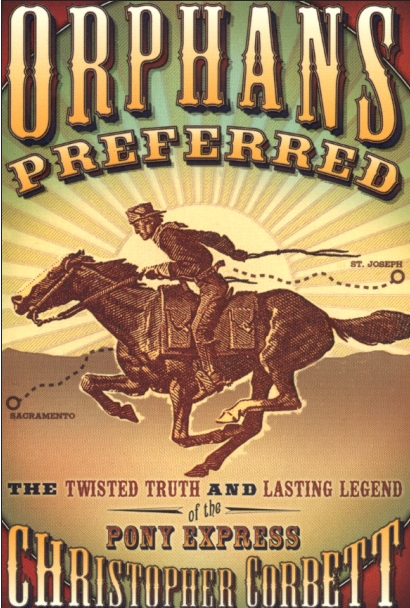Christopher Corbett seems like an unlikely candidate to be a writer of Old West stories.
He grew up in Waterville, and despite traveling widely, has spent most of his life entrenched in the Northeast.
But Corbett is a journalist, and he has always had a nose for a good story. In Americana lore, there is perhaps no greater story than that of the Pony Express.
“Did you know the Pony Express was in business for only 78 weeks?” he asks by phone from his home in Maryland. “I could have won a lot of money in bars betting people how long it was around. It’s a powerful memory of the Old West. People who do not speak a word of English know the Pony Express.”
Corbett, who will speak at the Maine Festival of the Book, has several books to his credit, including “Orphans Preferred: The Twisted Truth and Lasting Legend of the Pony Express” from 2003. It was just released in paperback. His latest book is another Old West story, “The Poker Bride,” about Chinese immigrants who came to California with the gold rush of 1849. Atlantic Monthly Press published “The Poker Bride” last year.
Corbett will speak with Colin Sergeant at 3 p.m. Saturday in a session titled “True Tales of the American Frontier.”
During his research for the Pony Express, Corbett spent many months out West. He retraced the Pony Express route from Missouri to California over and over again until the geography felt familiar. Without that familiarity, he knew his book would lack authenticity.
The Pony Express was a mail service that crossed the Great Plains, the Rocky Mountains and the High Sierras. It operated from April 1860 to October 1861, and became a means of communication before the telegraph.
As he immersed himself in the present-day West, Corbett found himself enthralled by the stories and half-truths that surrounded those stories. Somewhere in Idaho, he heard a tale about an attractive Chinese woman who came to California during the Gold Rush as part of the sex trade. She ended up in Idaho, and then was lost in a poker game to a Connecticut Yankee.
“It’s a beloved piece of Idaho folklore,” Corbett said. “The newspaper that reported her death in 1933 called her the Poker Bride, and I thought it was a good title for the book. (Mark) Twain said somewhere that we should write about a man instead of mankind. Put a human face on the story. She seemed to me to put that face on this story.”
The story of the Gold Rush has universal appeal. It represents not only the American dream, but the dream of many. In 1849, word of gold in California reached Hong Kong sooner than it reached Maine, Corbett said. The Chinese were on the next boat. They called California the Golden Mountain. “You could cross the Pacific in 45 days with good wind. From Portland, it was a good six months or more around the horn,” he said.
Chinese streamed into California in hopes of making it rich. Few did. To be Chinese in the American West was not fun. It was hard work and a difficult life. That’s the backbone of the story for “The Poker Bride” and the truth about a period in American history that often is associated with unbridled opportunity.
In his books, Corbett is not interested in perpetuating falsehoods about the West. He wants to find the truth. The truth is elusive, and shrouded in mystery.
“Americans love the memory of the Pony Express,” he said. “It’s rooted in fact and layered in a century-and-a-half of embellishment and lies. Like Paul Revere’s ride, Americans love that kind of story.”
Staff Writer Bob Keyes can be contacted at 791-6457 or at:
bkeyes@pressherald.com
Follow him on Twitter at:
twitter.com/pphbkeyes
Send questions/comments to the editors.




Success. Please wait for the page to reload. If the page does not reload within 5 seconds, please refresh the page.
Enter your email and password to access comments.
Hi, to comment on stories you must . This profile is in addition to your subscription and website login.
Already have a commenting profile? .
Invalid username/password.
Please check your email to confirm and complete your registration.
Only subscribers are eligible to post comments. Please subscribe or login first for digital access. Here’s why.
Use the form below to reset your password. When you've submitted your account email, we will send an email with a reset code.